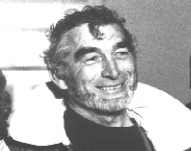
| A Face from the Past |
|
I was in the Northampton public library during the autumn browsing through the few books on sailing, when my eyes fell on the photograph of someone against whom I had once sailed. I had last seen him at a Police Laser regatta run in the Met. The person in the book wasn't sailing a Laser this time - but a giant multihull and the photo had been taken in mid-Atlantic.
I first met Peter Phillips in the early 80's at which time he still served as a skipper in the Control Room at Devon & Cornwall. At the Laser regatta I had sat with him between races while he expounded his philosophy on offshore sailing - I little realised at the time just the extent of his experience but I realised that it took a special kind of person with a strong philosophy on life (and death) to face up to the challenges of deep sea sailing. Peter was then sailing a boat called Livery Dole (the company name of a group of garages in the south-west who helped by sponsorship). I just could not figure out how a serving officer could afford (the time as well as money) to commit himself himself to such serious sailing. No doubt living close to the sea was a great advantage. . . and a sympathetic Force.
In the years that followed I looked out for any mention of him in the big offshore races; the OSTAR, the Round Britain, the Round the World. There his name was, alongside such notables as Chay Blyth, Tony Bullimore who recently hit the headlines with his dramatic rescue in the Southern Ocean, Tabarly, Pajot - other French heavyweights and a mass of sailors from all over the world that take part.
In 1984 Peter retired from the Force and once again competed in the single-handed Plymouth to Newport event by now called the Observer/Europe One Single-handed Transatlantic Race. It took him just over half a year(with help) to build a mutlihull fit for the race across the Atlantic. It's an expensive business of course, but he was able to obtain sponsorship and support from a computer/navigation company after which he named his boat for the race, Travacrest Seaway. I can remember reading the reports at the time - Peter got into the lead early on and while the wind blew he was able to maintain his position against the 90-odd starters. Reliant on newspapers, each day I had looked out for his position as the fleet fought their way across the Atlantic in heavy weather. Peter sped on ahead of the rest while capsizes, dismasting, hitting whales and general leaks and damage accounted for 27 boats which failed to complete the course A few hundred miles from the finish the wind dropped and due to the general weight of equipment on his boat Peter was slowly overhauled by the lighter boats. Nevertheless, he finished 4th overall, the first Briton home, surrounded by a large group of Frenchmen who, over the years since the inception of the race in 1960, have taken Ocean Racing to their heart and proved exceptionally successful.
|
| The picture's caption read: 'Travacrest Seaway' shows her heels. If the nation which invented the Observer Singlehanded Transatlantic Race is to win again, it will be with a boat as purposefully designed as this one and with a skipper as dedicated as Peter Phillips. |
These books cover the plunge into, what was before 1960, a virtually unknown
experience - crossing the Atlantic, "up-hill" (east to west),
single-handed..
OSTAR by Lloyd Foster
SINGLE HANDED by Libby Purves & Trevor Grove
"Seventy-mile-an-hour winds are laced with ice. If your skin is exposed you get lacerated. Waves bigger than houses approach and you think it's curtains, but the boat forges into the wave and 10ft of water buries the yacht and crew from stem to stern. Gasping for breath, you think we won't come up, but slowly, so slowly, the water clears enough to see the next house wave coming. We have three crew members on deck for 15 minutes each. Any more and the cold is likely to cause hypothermia. Do your job like clockwork, don't think about the battering of the waves or the pain of the cold. Too cold even to take off the dry-suit. You just climb into your bunk, boots and all, to catch a few moments sleep before the next call."
| Just recently Peter kindly sent me a book on the last British Steel
Challenge Round the World Yacht Race (see opposite) from which the quote above is taken.
The book is not publicly available. It makes interesting reading, particularly as there are two 'Round the World'(ish) events currently taking place and this book should provide a good idea of what's involved. If you would like to borrow the book which tells of all the boats competing including Peter who sailed Rhône-Poulenc for most of the race, please contact me. |
 |
Offshore sailing has never been my thing. I was quickly cured in 1980 just sailing from the Blackwater across to the North Sea Yacht Club, Ostend with a job colleague (who shall remain nameless) who first navigated us to Dunkirk by mistake. Crossing the Channel shipping lanes in the middle of the night was not the kindest introduction to offshore sailing. I kept to the Laser. But after reading the above mentioned books, I can have nothing but admiration and respect for those sailors that were prepared to give commitment, money, time, sometimes their life to the sea.
| Exultation is the going Of an inland soul to sea, Past the houses - past the headlands - Into deep Eternity - Bred as we, among the
mountains, Emily Dickinson c. 1859 |
Dick S. - November, 2000